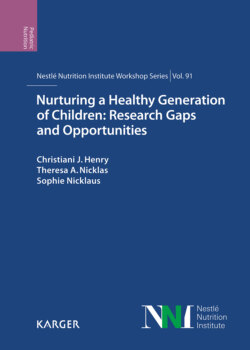Nurturing a Healthy Generation of Children: Research Gaps and Opportunities

Реклама. ООО «ЛитРес», ИНН: 7719571260.
Оглавление
Группа авторов. Nurturing a Healthy Generation of Children: Research Gaps and Opportunities
Nestlé Nutrition Institute Workshop Series
Nurturing a Healthy Generation of Children: Research Gaps and Opportunities
Contents
Preface
Foreword
Contributors
Early Development of Taste and Flavor Preferences and Consequences on Eating Behavior
Abstract
Introduction
Evolution of Taste and Odor Preferences in Early Life
Effect of Early Taste and Flavor Experiences on Taste and Food Preferences
The Influence of Taste and Odor Preferences on Infants’ Eating Behavior
Conclusions
Practical Implications
Acknowledgments
Disclosure Statement
References
Early Development of Food Preferences and Healthy Eating Habits in Infants and Young Children
Abstract
Introduction
A Spoon of Culture and Tradition
Early Development of Sensory Experience
A Spoon of Variety at Complementary Feeding – A Window of Opportunity
Repeated Exposure
Discussion and Conclusion
Disclosure Statement
References
Effect of Parental Feeding Practices (i.e., Responsive Feeding) on Children’s Eating Behavior
Abstract
Introduction
Child Eating Behaviors
Feeding Practices
Evidence for Associations between Feeding Practices and Child Eating Behaviors. Pressure to Eat
Instrumental and Emotional Feeding Practices
Restriction
Structure of the Mealtime Environment
The Reciprocal Relationship between Child Eating Behavior and Maternal Feeding Practices
Limitations, Future Research Directions, and Conclusions
Disclosure Statement
References
Parental Feeding Practices and Associations with Children’s Food Acceptance and Picky Eating
Abstract
Introduction
Do Not Give Up if the Child Does Not Like Something the First Time
Instead, Use Repeated Exposure, Vary Preparations, and Cook Together
Do Not Pressure the Child to Eat
Use Modeling and Reasoning Instead
Do Not Use Food Rewards
Use Nonfood Rewards or Praise Instead
Do Not Cook Separate Meals for Your Child
Provide Choices among Healthy Options Instead
Conclusions
Disclosure Statement
References
Summary on Early Eating Behavior and Taste Development Influence in Children
What Children Eat in Developing Countries: Diet in the Etiology of Undernutrition?
Abstract
Diet in the Etiology of Undernutrition
Prevalence of Stunting and Wasting
Why Is There Such a High Prevalence of Stunting and Wasting Worldwide?
Protein: Energy Percent of Breast Milk
Preparation of Weaning Foods in Developing Countries
Method to Improve the Energy Density of Weaning Foods
Can Ready-to-Eat Therapeutic Food Be a Model to Develop Weaning Food with High Energy Density?
Conclusion
Disclosure Statement
References
Children’s Eating Behaviors and Energy Intake: Overlapping Influences and Opportunities for Intervention
Abstract
Introduction
Child Portion Selection and Energy Intake
Eating Rate and Energy Intake at 4.5 and 6 Years
Eating in the Absence of Hunger and Child Inhibitory Control
Parental Influences on Child Eating Behaviors and Energy Intake
Conclusions: Future Opportunities for Integrated Behavioral Interventions
Acknowledgments
Disclosure Statement
Funding Sources
References
FITS and KNHS Overview: Methodological Challenges in Dietary Intake Data Collection among Infants, Toddlers, and Children in Selected Countries
Abstract
Introduction to FITS and KNHS
Scientific Approach
Cross-Country Comparisons
Methodological Similarities and Challenges
Summary and Recommendations
Disclosure Statement
References
Kids Nutrition and Health Study in China
Abstract
Introduction
Subjects and Dietary Intake: Data Collection
Nutrient Intakes in Chinese Children
Energy Intake and Its Food Sources
Double Burden of Malnutrition
Meal Consumption and Food Patterns at Breakfast and Snacking
Physical Activity
Limitation
Conclusion
Disclosure Statement
References
Feeding Patterns of Infants and Toddlers: The Mexico Case Study
Abstract
Introduction
Feeding Infants and Toddlers Study in Mexico
Conclusion
Disclosure Statement
References
The 2016 Feeding Infants and Toddlers Study (FITS): Dietary Intakes and Practices of Children in the United States from Birth to 48 Months
Abstract
Introduction
Methods
Results. Dietary Supplements
Infant Feeding Practices
Dietary Intakes
Conclusion
Disclosure Statement
References
Usual Energy and Nutrient Intakes and Food Sources of Filipino Children Aged 6–12 Years from the 2013 National Nutrition Survey
Abstract
Introduction
Methods. Subjects
Data Collection
Statistical Analysis
Results. Energy and Macronutrients
Vitamins
Minerals
Food Sources
Discussion
Conclusions
Disclosure Statement
References
Food and Nutrition in Malaysian Children
Abstract
Introduction
Nutritional Status of Malaysian Children
Nutrient Intake of the Children in Malaysia
Food Habits of Malaysian Children
Conclusion
Disclosure Statement
References
Summary on What Children Eat
Breakfast: Shaping Guidelines for Food and Nutrient Patterns
Abstract
Introduction
Maximizing Quality Breakfast Uptake
Present Governmental Guidelines on Food and Nutrition Standards for Breakfast
Cluster Analysis and Its Application to Optimal Breakfast Food and Nutrient Choices
The International Breakfast Research Initiative
Exploring Strategies to Set Goals to Optimize Food Intakes at Breakfast
Promoting Healthy Breakfasts in the Digital Era
Conclusions
Disclosure Statement
References
The Importance of Dietary Protein at Breakfast in Childhood
Abstract
Introduction
Dietary Protein
Diurnal Protein Turnover
Dietary Protein in Children
Protein at Breakfast
Dietary Protein Distribution in Children
Conclusion
Disclosure Statement
References
Breakfast Consumption versus Breakfast Skipping: The Effect on Nutrient Intake, Weight, and Cognition
Abstract
Introduction
Nutrient Contribution of the Breakfast Meal
Breakfast and Weight
Breakfast and Neuropsychological Functioning
Challenges, Opportunities, and Research Gaps with Breakfast Studies
Conclusion
Disclosure Statement
References
Breakfast, Glycemic Index, and Cognitive Function in School Children: Evidence, Methods, and Mechanisms
Abstract
Introduction
Breakfast-Based Postprandial Glycemic Response and Cognition
Breakfast, Postprandial Glycemic Response, and Cognitive Function: Important Methodological and Conceptual Factors
Conclusion
Disclosure Statement
Funding Sources
References
Summary on Importance of Breakfast for Children’s Health and Development
Subject Index
Отрывок из книги
Nurturing a Healthy Generation of Children: Research Gaps and Opportunities
Theresa A. Nicklas Houston, TX
.....
Universidad Nacional Autonoma de Mexico
Calle Dr. Marquez No. 162.
.....